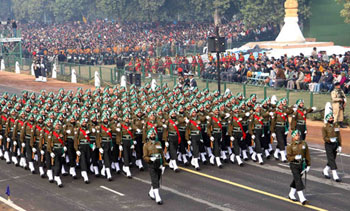
New Delhi,Jan 23: The presence of US President Barack Obama as the chief guest during the Republic Day parade and the heightened security plan requires a section of ticket seekers for the mega event to deposit an identity proof at the ticket counter – a condition introduced for the first time.
While officials claimed that the stipulation of depositing a government document to prove identity applies to a small section of ticket seekers, people who queued up outside a ticket counter near India Gate said the rule was being applied to all. Defence ministry officials confirmed that a new pre-condition has been introduced this year for general public who wish to buy a Rs 300 ticket for a seat close to the saluting podium.
“Those buying the Rs 50 and Rs 10 tickets need not give an ID proof,” said a ministry official.
The new condition for ticket sale was introduced for additional security as the Rs 300 ticket holders usually sit very close to the VIP enclosures, he added.
A ticket seeker, who did not wish to be named, said: “I bought a Rs 50 ticket but the official at the kiosks insisted on taking my ID proof.”
Imran, a ticket seeker, said the new condition came as a surprise. “I had to go all the way back to my home and get the documents,” he said. Some ticket seekers also complained about the erratic working hours of the kiosks selling the tickets. “Earlier this week, I came and stood in the queue at 7 am but I could get the ticket only around noon as the counter opened late,” said a government employee, who had come to pick up another ticket for a family member.On some days, the counter did not open. On some days, it opened at 2 pm and the tickets were over within an hour, said another government employee who works in an office near India Gate.
“The clerk brings very few tickets for sale at the counter near Jamnagar House,” he said.
Another ticket seeker complained the VIP ticket seekers were being given more than one ticket despite a restriction.
“Some influential people came with 10-12 ID proofs and took away many tickets in one go while we kept waiting for our turn in the queue,” said Alok Pathak, a ticket seeker.





Comments
Add new comment